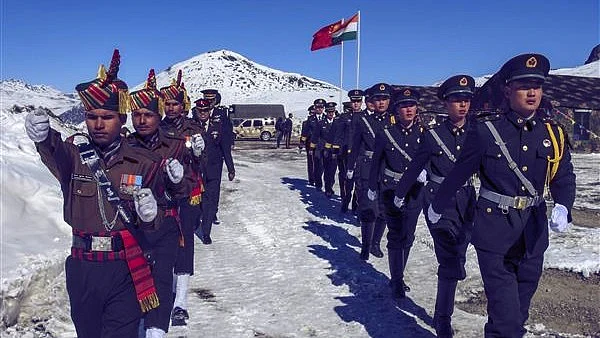On 14 August 2023, India and China concluded the 19th Round of Commander Level Talks at Chushul with the goal of resolving the three yearlong military standoff.
The 18th round of talks was held in April 2023, and the one before that was held in December 2022. These talks were headed by Lt Gen Rashim Bali from the Indian side and the commander from the South Xinjiang military district from the Chinese side.
This also forces one to speculate that the cordial tone of the talks is primarily leg work for the upcoming meetings between the Indian and Chinese leaders.
Prime Minister Narendra Modi and President Xi Jinping are scheduled to meet each other at the upcoming BRICS summit in South Africa (22 – 24 August 2023) and Xi Jinping is also expected to attend the G20 summit in New Delhi (9-10 September 2023). The recent talks were scheduled just weeks before the upcoming G20 Summit which is under India's presidency.
An Extremely Adamant China
India and China have been engaged in a military standoff since the May 2020 Galwan clashes. These clashes marked the end of the Confidence Building Mechanisms (CBMs) established between the two sides after the violent clashes where both sides lost soldiers. These clashes also completely changed the nature of the bilateral relations and were a clear sign of growing Chinese aggression which is especially directed towards India. It also gives an indication that Beijing feels that it is strong enough to unilaterally alter the Line of Actual Control (LAC) and gain an advantage on the border issue.
In the last nine months, India and China have held three Commander Level Talks. As per the Ministry of External Affairs statement published on their website after the conclusion of the recent talks, “They agreed to resolve the remaining issues in an expeditious manner and maintain the momentum of dialogue and negotiations through military and diplomatic channels. In the interim, the two sides agreed to maintain the peace and tranquility on the ground in the border areas.”
This clearly indicates that no concrete development happened even during the recent talks which could change the existing status-quo. But in the last three years, conflict points like north and south banks of Pangong Tso and Galwan Valley and the Gogra-Hot Springs area have had some de-escalation as buffer zones have been created.
However, the situation on the ground has the capacity to get violent given that both sides have advanced weaponry and 60,000 boots on the ground across the Ladakh border. As the recent talks failed to achieve any concrete achievement the two sides conducted a Major General Level talks on 18 August 2023, at Chushul and Daulat Beg Oldie (DBO).
But this military standoff between India and China is giving no sign of easing anytime soon. Beijing is proving especially difficult to negotiate with. China has been very adamant about not ready to give in to any Indian demands and as per reports Chinese army has been especially aggressive by blocking Indian patrolling in the concerned region.
The Economy, the US, and Taiwan
This aggressive posturing adopted by Beijing seems to have very strong roots in its domestic developments and challenges. Since the pandemic outbreak, the Chinese economy has faced one of its biggest hurdles. The slowdown has hit China very badly and the situation is becoming increasingly worse with the economy showing no signs of recovery. This is despite the Chinese government’s efforts to help put in all its energy to make the economy regain its pace of growth.
In addition to this the growing India-United States relations have also made Beijing uncomfortable. New Delhi and Washington have been warming to each other and this has been construed as being anti-China. Beijing has been especially vocal about this development regularly criticising New Delhi. This is also happening at a time when China-United States relations are at an all-time low. Most of the attempts to talk have consistently failed and China has become increasingly aggressive and even retaliating by banning the export of critical material to the United States.
The development across the Taiwan Straits have also mutated in a direction not palatable to China. Taiwanese leadership has consistently become independent in their diplomatic dealings and have undercut Chinese warnings. China has engaged in military drills as a warning however, the consistent support from the United States to Taiwan has upset China.
Given these developments, the current Chinese government feels targeted from all directions. The United States and Taiwan are very sensitive topics for the Chinese government and heavily swayed by domestic nationalism. Given that most of the issues which are challenging to the Chinese government appear to be out of their control. The economy, the United States and Taiwan, all impact the domestic legitimacy of the Chinese government.
Thus, it appears that China is all keen to appear tougher in its foreign policy negotiations, especially with respect to India. It is also an effort to continuously undermine the Indian aspirations to be a strong and independent voice of the South Asian countries. It is also a very prominent technique of Beijing to keep India occupied with domestic issues and in the process undermine its regional and global aspirations.
(Dr Gunjan Singh is an Assistant Professor at Jindal Law School, OP Jindal Global University. Her research interests are in the fields of Chinese Foreign Policy, China-South Asia Relations, Domestic Politics in China, Chinese Media, Mainland-Taiwan Relations and Space Security. This is an opinion piece and the views expressed are the author’s own. The Quint neither endorses nor is responsible for them.)
